Considers various forms of culture through the lens of children, the starting point for all humanity.
The curriculum is comprised of three areas: children’s literature, children’s culture, and creative production.
Department of Children’s Culture
Three Key Learning Components
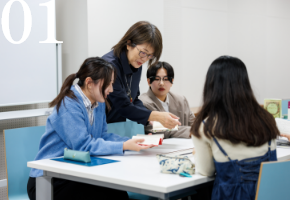
Let your interests inspire exploration and thought
Picture books, fairy tales, fantasy, anime and games, toys and free gifts, characters, amusement parks... Which of these were you passionate about as a child? Some of these you may still like and engage with now. In this program, students are able to delve deep into their own interests to explore the reasons behind their appeal.
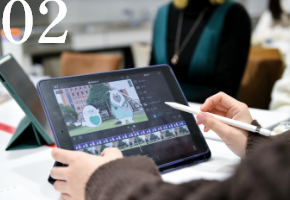
Explore culture that children and adults have in common
Whether it be anime, games, characters... Culture that children and adults have in common has gained worldwide popularity in recent years. Students will think about the diversity of an increasingly borderless and globalized world, and explore the potential for new culture within this world.
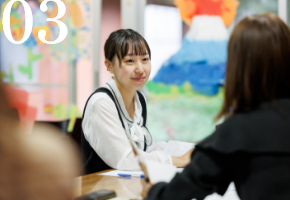
Create culture from the perspective of children, the starting point for all humanity
Students will be given the opportunity to reevaluate culture through the lens of children, the starting point for all humanity. In doing so, they will develop the ability to assist in and be inspired by the creation of a specific kind of culture that has been passed down through children, or that incorporate the perspectives of the children who will be responsible for the next generation.
Department of Developmental Psychology
Conducts research on the growth and development of a person’s mind throughout their lifetime, from a scientific perspective.
Students will learn psychological theories and research methods, and develop the ability to answer questions about the mind.
Three Key Learning Components
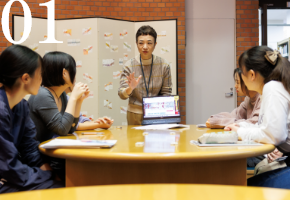
Study psychology from the perspective of developmental support
Students will gain an understanding of how the mind develops and grows through the lens of developmental and clinical psychology, explore the causes of mental issues, and think about the kind of support that can be provided to people with disabilities and illnesses, as well as their families
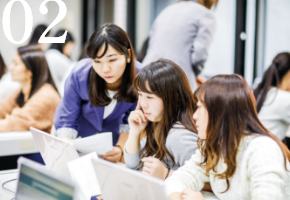
Develop the ability to think logically and imagine the human mind
Students will quantify data acquired objectively through means such as experiments, interviews, and surveys, and engage in scientific analyses of the human mind using techniques in psychological statistics. In doing so, they will develop the ability to think in a logical, data-driven manner, understand the points of views of others, and interact with others.
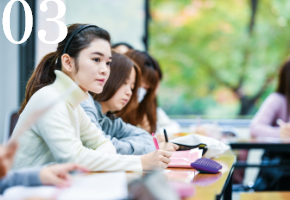
Think about your own life plan
Through these classes, students will deepen their self-understanding and consider their long-term plan for their own lives. Students will broaden their career choices by developing a concrete image of the kind of careers they wish to pursue in the future, whether it be to become a psychologist, or to work in a job that makes use of psychology.
Department of Child Care and Primary Education
This program is divided into two courses, both of which cultivate childcare professionals and educators with both intellectual and practical skills, through theory and hands-on experience.
Three Key Learning Components
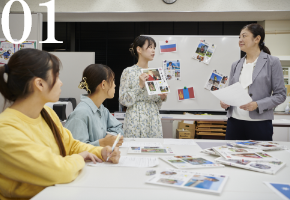
Acquire certification through two courses: Early Childhood Education Course and Primary Education Course
This program cultivates student expertise through two courses: the Early Childhood Education Course, in which students learn the knowledge and skills needed for the education and care of infants and toddlers, thus gaining the ability to become preschool and nursery school teachers, and the Primary Education Course, in which they develop the skills for coming up with elementary school educational activities and the ability to become elementary school teachers.
*Students may also take other courses starting in their second year
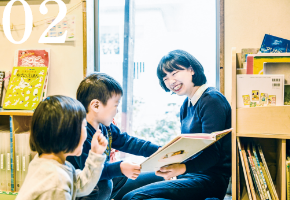
A wide range of hands-on subjects that allows students to learn in actual childcare and educational settings
Both courses offer hands-on experience in childcare and education in preschools/nursery schools or elementary schools starting in the first year.
Students will develop their abilities by going back and forth between the university and these settings. Gaining practical experience at an early stage will allow students to advance smoothly into their practical training in childcare and education.
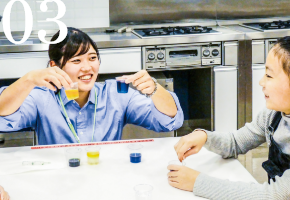
Curriculum that allows students to learn about childcare and education through multiple perspectives
Students may also take courses from the Department of Children’s Culture and Department of Developmental Psychology as adjacent courses to help deepen their understanding of children. Students will learn multifaceted approaches to childcare and education that promote the healthy growth of children, both mentally and physically.
